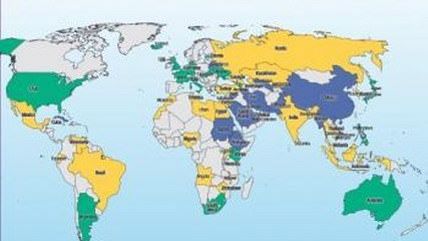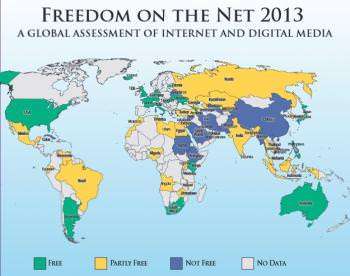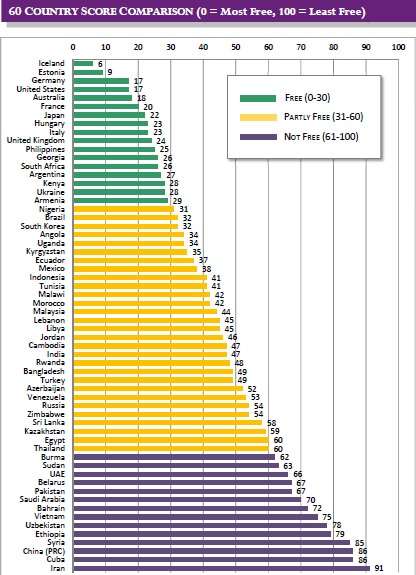Internet Freedom Loses Ground Around the World, Says Report, But Not Without a Fight


It's no surprise, in the year of Edward Snowden and after the bust of the wonderfully free-market Silk Road and its alleged proprietor, that the Internet isn't quite as free as it used to be. But according to a new report from Freedom House, it's not just NSA targets and online purveyors of disfavored intoxicants that have taken a hit: surveillance, censorship and arrests of social media-wielding dissidents have cast a pall over what was once a more-anarchic medium. In response, however, authoritarian officials sparked push-back by activists who blocked some repressive laws and even pressured regimes to repeal previously imposed measures.
In Freedom House's Freedom on the Net 2013: A Global Assessment of Internet and Digital Media, the authors write:
[G]lobal internet freedom has been in decline for the three consecutive years tracked by this project, and the threats are becoming more widespread.
Of particular concern are the proliferation of laws, regulations, and directives to restrict online speech; a dramatic increase in arrests of individuals for something they posted online; legal cases and intimidation against social-media users; and a rise in surveillance. In authoritarian states, these tools are often used to censor and punish users who engage in online speech that is deemed critical of the government, royalty, or the dominant religion. In some countries, even blogging about environmental pollution, posting a video of a cynical rap song, or tweeting about the town mayor' s poor parking could draw the police to a user's door. Although democratic states generally do not target political speech, several have sought to implement disproportionate restrictions on content they perceive as harmful or illegal, such as pornography, hate speech, and pirated media.
Specifically, of the 60 countries examined by the report, 34 have experienced declines in Internet freedom. Those countries include not just the usual suspects trying to smother criticism of fearless leader, but also "democracies, often as a result of struggles to balance freedom of expression with security." India gets called out, in particular, for blocking Internet and mobile communications, restricting online content and bringing charges against social med users for their posts.
Brazil also gets a dishonorable mention for election-related content restrictions, and for violence against online journalists.

And then, of course, there's Uncle Snoopy himself: the United States and its panty-sniffing intelligence apparatus, particularly the NSA.
The good news, is that authoritarian online policies have caused a reaction by advocates of freedom and privacy:
[I]n a number of places around the world, growing efforts by civic activists, technology companies, and everyday internet users have been able to stall, at least in part, newly proposed restrictions, forcing governments to either shelve their plans or modify some of the more problematic aspects of draft legislation. In a handful of countries, governments have been increasingly open to engagement with civil society, resulting in the passage of laws perceived to protect internet freedom.
That's not enough to entirely offset the erosion of online freedom, but it means that government efforts to regulate and stifle the Internet don't go unopposed.
Left unmentioned in the report is the growing demand for data havens—that is, for online companies to base themselves in jurisdictions that respect information privacy, and for people to seek out companies that do exactly that. Encryption technology that impedes or totally blocks snoops is gaining popularity for individual, business and government use, with encrypted services basing themselves beyond the borders of countries that demand backdoor access to communications and data.
Internet freedom may be sliding, but it's doing so in such a public way that it has sparked both legal and technological opposition. That's no guarantee of success for privacy and free speech advocates—but it means they're not going down without a fight.
Editor's Note: As of February 29, 2024, commenting privileges on reason.com posts are limited to Reason Plus subscribers. Past commenters are grandfathered in for a temporary period. Subscribe here to preserve your ability to comment. Your Reason Plus subscription also gives you an ad-free version of reason.com, along with full access to the digital edition and archives of Reason magazine. We request that comments be civil and on-topic. We do not moderate or assume any responsibility for comments, which are owned by the readers who post them. Comments do not represent the views of reason.com or Reason Foundation. We reserve the right to delete any comment and ban commenters for any reason at any time. Comments may only be edited within 5 minutes of posting. Report abuses.
Please to post comments


"No Data" for Canada, eh?
Canada, U.S., what's the difference?
Well, for one thing, in the U.S. not too many people know what poutine is.
Pretty sure Americans are familiar with poontang. You spelled it wrong btw.
(this is my backwards attempt to turn "poutine" into a new slang term for pussy)
Hmmm, pussy with cheese curds and gravy? DO NOT WANT.
More to the point, why isn't there any bacon involved in poutine? Even the fake Canadian variety.
I think you have a very good point.
Go on...
Look up a place called Smoke's Poutine. You can get pretty much anything you want on a poutine. My favorite is the tripple pork poutine: Pulled pork, sausage, and bacon, on fries cheese and gravy.
The fact that you U.S.'ers don't have poutine continues to blow my mind. It is by far the best (greasy) food I have ever tasted.
Smoke's Poutinerie
There are places that serve it in the US, just not very many.
Speak for yourself!
http://epicdeli.com/epic-poutine/
Such distinctions are apparent to North Americans, not to the whole rest of the planet.
Nor Poland, Scandanavia nor CZECH REPUBLIC!!!
There is data from Canada, it's just covered in snow.
Just like burning a flag
"Take. Eat."
Next time I'm in Chicago, I got to go to this place. Thanks for the tip, RBS.
If it's unconsecrated it's utterly meaningless to Catholics. Just a piece of stale flatbread.
But the whole "We never meant to offend anyone" is either complete bullshit or an indication of hopeless naivete. Creating a menu item like this is guaranteed to offend a fair amount of people. The fact that he expects people to "have a sense of humor about it" indicates to me that he knows it's a poke in the eye to some people.
NTTAWWT, but this is pretty clearly an attempt to drum up publicity through controversy.
I'm sure that it was intended to be at least a bit controversial. But I bet that for every Catholic they offend, they attract the interest of 2 lapsed Catholics and 3 metal fans.
Oh, of course that's the calculation they made. I'm just saying the protestations of inoffensiveness are bull. They knew exactly what they were doing.
I agree. A much better response on their part would have been "everything offends someone".
If it's unconsecrated it's utterly meaningless to Catholics.
Fucking statists.
Looks sacrilicious.
*blinks* Y
ou...I mean... OK.
*walks away shaking head*
What? Sweating Gin's comment was brilliant. Don't tell me you're nonplussed.
It was... Homeric...
I'm unimpressed. Christian sacrilege is so common that it's passe. If they were really edgy, unbelievers would openly blaspheme Allah and dis his Prophet. If they were to add the "Taste of Mecca" Bacon Cheeseburger and Big Mohammad's (PBUH)Pulled Pork Sandwich to the menu, that would be an impressive display of open blasphemy.
Kuma's does metal themed burgers.
Metal doesn't care about Mohammed, it cares about Jesus, so to speak.
(What I don't comprehend is why anyone would make a Ghost burger. They're not very interesting.
But it does make sense to use a wafer, since Ghost is Catholic/Pope-themed.)
authoritarianism sparking a reaction? people don't like being oppresed?
Who Knew?
"And then, of course, there's Uncle Snoopy himself: the United States and its panty-sniffing intelligence apparatus, particularly the NSA."
2chili, I love you.
Can internet freedom gain ground? The internet started (from my estimation) at 100% free. Therefore, it can only be curbed. I mean, sure, it can be brought back when lawmakers suddenly say, "Hang on, our desire for power shall be supplanted for the betterment of our people!"
Barring that, it's net neutrality legislation all the way down.
What was the foreign country where the Silk Road servers were located? You know, the country that gave the FBI assistance in getting server images?
"Hang on, our desire for power shall be supplanted for the betterment of our people!"
They've forgotten the core lesson of parasitism: you don't kill the host.
Yes, there's nowhere to go but down.
The truly appropriate quote for the internet is that on any compromise on internet freedom, only the evil can profit.
I see North Korea isn't on the list.
Also, I think the US should be taken down to "partly free" considering all the NSA spying and the arrest of Dread Pirate Roberts.
To be sure, the NSA is spying on foreign nationals as much as it is on us.
Everyone is partly free! Thanks, NSA!
That isn't at all comforting.
It's highly likely that it was the NSA that tipped off the DEA about Ultrecht's identity.
So, whether or not the NSA MOSTLY looks at foreigners, it's an undeniable fact that if you are a US citizen, and you are doing something illegal, the NSA will tell law enforcement about it if they happen to stumble upon it.
And given the volume of internet traffic and communications they are analyzing it is nearly impossible that they won't notice a lot of stuff.
The only way you might fly under the radar is by completely severing all communications with non-US citizens or people outside of the US.
I want the NSA to stop spying, too, but we're not the only victims of that. Sure, I know we're going to spy on bad guys abroad, but, if anything, the NSA exercises less restraint with the innocent abroad than they do here. And drone process is inferior to due process, even today.
It's highly likely that it was the NSA that tipped off the DEA about Ultrecht's identity.
There is no solid evidence of this.
They are the only ones who could have figured out where the servers were.
I don't think NK has any internet access except for high officials.
The argument could be made (though I don't know that I buy it) that the spying doesn't make the internet less free. They aren't stopping any internet activities. Just making it less private and secure.
I think that the seizure of domains without due process because of alleged DMCA violations is a bigger threat to internet freedom.
You know what? This means that the Internet surfing of certain beloved leaders is known to the NSA.
The fight with Kim Dotcom is still ongoing. Luckily he's become a well-liked public figure in New Zealand, otherwise we would not have Mega and he surely would've been extradited by now
I don't think we have come anywhere close to fully appreciating the impact that the NSA's surveillance really has on us.
If you want to resist the US government, you have no place to hide. Period.
Except Ultricht hid for years despite being sloppy.
The problem I have with these kinds of reports is that they tend to measure "freedom" in a large aggregated way, not taking into account that there are different weights and effects for different people.
I don't think the US is really free, but neither do I think Iceland is much better. They have less snooping and the gov may nominally have better guarantees of privacy, but then they banned a couple of futuba-chan-like boards (4chan, others):
http://en.wikipedia.org/wiki/I.....Censorship
All of Iceland is web filtered and there is a gov program for the public to report suspicious links. WTF is up that, for Freedom House's #1 ranked country?
Yeah, Silk Road allowed the hiring of assassins, not very libertarian.